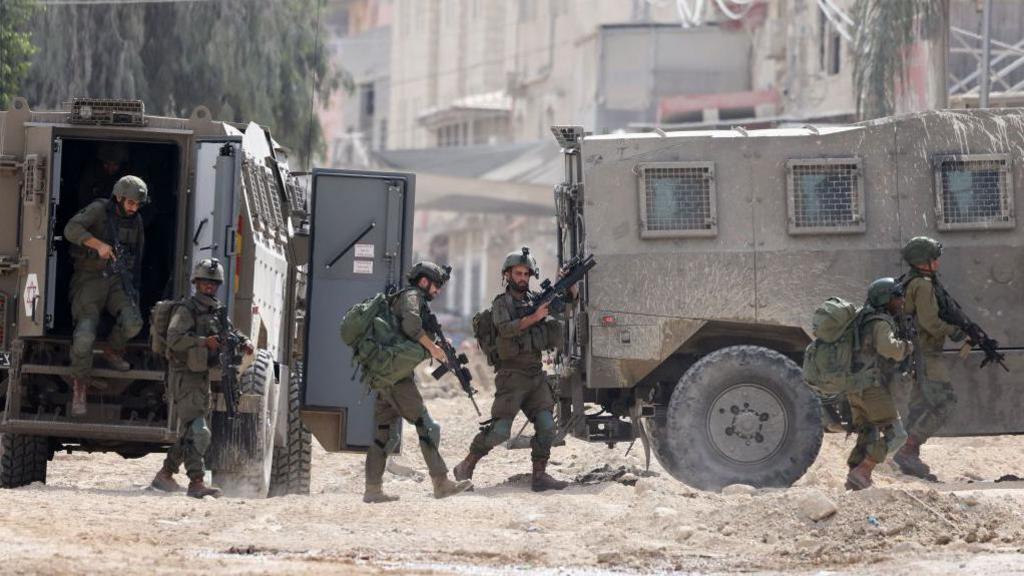UN calls for de-escalation as Israeli West Bank raids continue

The Israeli military - pictured here on Wednesday - has conducted raids in a number of West Bank cities over the past two days
- Published
Israeli forces have carried out raids in the occupied West Bank for a second day running, leading to calls for de-escalation from the United Nations.
The Israel Defense Forces (IDF) said on Wednesday it was beginning a "counter-terrorism operation". On Thursday, it said 12 people had been killed in the cities of Jenin and Tulkarm and four in Far'a.
The Palestinian health ministry also reported 16 people had been killed since Wednesday morning.
UN Secretary General Antonio Guterres has called on Israel to immediately halt its operation, saying it was "fuelling an already explosive situation".
He urged Israeli forces to "exercise maximum restraint and use lethal force only when it is strictly unavoidable".
The IDF said five were killed after "exchanges of fire" in Tulkarm with militants who had "hidden inside a mosque". It said seven people had died in Jenin.
Mohammed Jaber, who is also known as Abu Shujaa, was among those killed, according to the Israeli military. He was reportedly the local leader of the Tulkarem Brigade, which is backed by the Palestinian Islamic Jihad militant group.
The IDF said Jaber was linked to a number of attacks on Israelis, and was planning more.
The Tulkarm Brigade said in a statement on Telegram that its fighters ambushed an Israeli infantry unit "in response to the assassination of our commander", without naming him.
The IDF said it had apprehended 10 wanted suspects, and recovered explosives and weapons during raids in Tulkarm and Jenin.
In Far'a, the IDF said it killed four armed militants inside a vehicle.
The Palestinian Mission to the UN condemned the raids in a letter, external on Thursday, saying the Israeli military had "invaded homes, deliberately targeted civilians, destroyed vital infrastructure and even besieged the four main hospitals in the area".
In response to the criticism, the IDF referred the BBC to its earlier statements that said it targeted armed militants, with some linked to previous attacks.
In Jenin, ambulances were being stopped and checked by military jeeps parked around the government hospital as security forces continued their operation in the city's refugee camp.
The camp is a base for armed groups, as well as a home to unarmed civilians, and has been the scene of many fierce gun battles in the past.
Israeli forces have blocked access to the camp and Palestinian phone networks have been disrupted.
It is the second day of what Israeli media say could be a days-long operation in the West Bank.
It is one of the largest such actions in the West Bank since the days of the second Palestinian intifada, or uprising, two decades ago.
At least 10 Palestinians killed in Israeli raids in West Bank
- Published28 August 2024
Israeli settlers are seizing Palestinian land under cover of war - they hope permanently
- Published27 August 2024
Six killed in West Bank strike and settler attack, Palestinian ministry says
- Published27 August 2024
Israel's ambassador to the UN, Danny Danon, said the operation has a "clear goal: preventing Iranian terror-by-proxy that would harm Israeli civilians".
In recent days, Israeli politicians have accused Iran - which backs both Hamas and Palestinian Islamic Jihad - of trying to smuggle in explosive devices with the aim of attacking Israel.
Israel "cannot sit idly by and wait for the spectacle of buses and cafes exploding in city centres", Mr Danon said in a post on X.
There has been a spike in violence in the West Bank since Hamas's 7 October attack on Israel, and the subsequent war in Gaza.
EU foreign policy chief Josep Borrell said Israel's operation in the West Bank "must not constitute the premises of a war extension from Gaza".
He said he was starting the process of asking EU members if they want to impose sanctions on "some Israeli ministers".
He accused the ministers - who he has not named - of "launching unacceptable hate messages against the Palestinians, and proposing things that clearly go against international law".